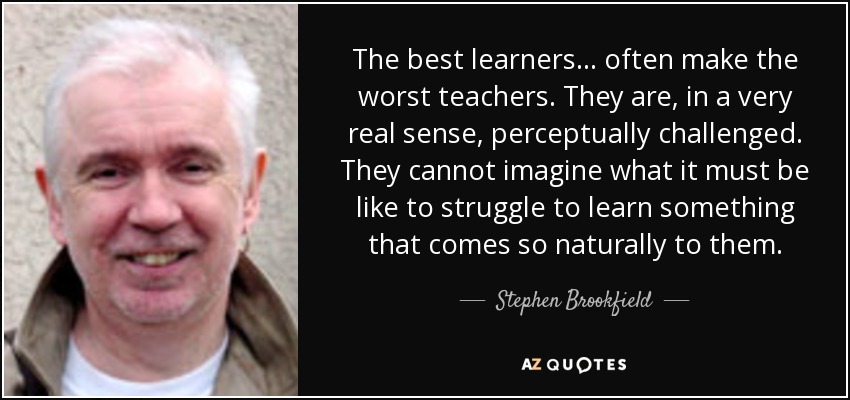THIRD TASK
Summary of Stephen Brookfield on creative and critical thinking.

At the beginning of the conference Stephen argues that a good teacher is anyone who defines himself as a thief of knowledge in the good sense of the word. According to this comparison, it shows it in the following way: teachers must know how to enter the classroom and quickly analyze what is valuable and necessary to take it, adopt it and modify it in favor of its practice. It should be noted that teachers have a link with the experience of both the training of their career and the relationship created with each of their students.
For this reason he considers that the pencil and paper tests that determine who passes or loses should not standardize the individual's abilities. The fact of giving a role of participation and freedom when it comes to expressing their ideas, makes the students feel comfortable in the surrounding area and feel the desire and comfort of showing others their knowledge. After his experience with the exams, he made the decision to change the standardized tests for something more flexible; because teachers should not teach their students to pass an exam, nor should students learn (memorize) just to take an exam.
For this reason he considers that the pencil and paper tests that determine who passes or loses should not standardize the individual's abilities. The fact of giving a role of participation and freedom when it comes to expressing their ideas, makes the students feel comfortable in the surrounding area and feel the desire and comfort of showing others their knowledge. After his experience with the exams, he made the decision to change the standardized tests for something more flexible; because teachers should not teach their students to pass an exam, nor should students learn (memorize) just to take an exam.
Stephen mentions within the key points of his lecture critical thinking as a process and skill by which he allows us to realize the assumptions that frame the ways in which we think, as well as the way we think about the beliefs of the society, and the assumptions that generalize the way we act. On the other hand, he highlights the creativity that allows us to encourage and analyze ideas from multiple perspectives. Thinking critically and creatively according to Stephen Brookfield is important because we stop seeing things from the obvious point of view, where nothing surprises or impresses us anymore.
He presents a triple classification.
PARADIGMATICO: common sense that is taken for granted.
PRESCRIPTIVE: Assumptions about how things should be.
CAUSAL: "My guess is that it results in this particular result"
"The problem with critical thinking is when we use this term we are working from the point of view of different intellectual traditions."
The fourth most common tradition:
ANALYTICAL PHILOSOPHY: When a student thinks critically, he has the ability to construct and deconstruct his own and too many arguments.
HYPOTHETICAL: The application of critical thinking will always generate new hypotheses.
CRITICAL THEORY: The student does not allow the ideological manipulation of a topic.
PRAGMATISM: a critical thinker is someone who has knowledge as something that is constantly reinvented and that is open to new ways of thinking new ways of practicing.
Critical and creative thinking occurs gradually; which can not expect its students to have a good development of critical and creative thinking if it has not been put into practice. The second, the teacher must present a situation that takes the students by surprise (in front and responds a "disorienting dilemma" (Mezirow))
No hay comentarios.:
Publicar un comentario